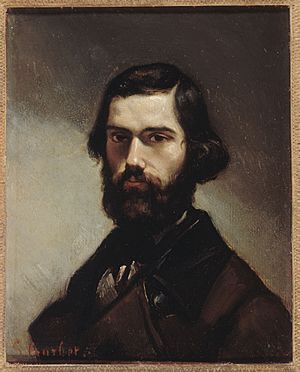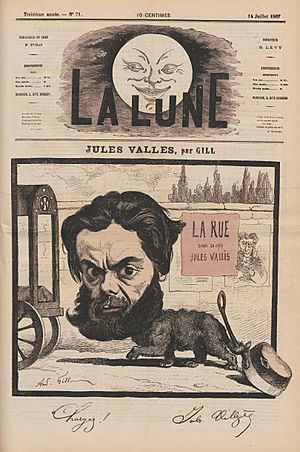Jules Vallès facts for kids
Quick facts for kids
Jules Vallès
|
|
|---|---|

Jules Vallès by Gustave Courbet
|
|
| Born | 11 June 1832 Le Puy-en-Velay, Haute-Loire, France |
| Died | 14 February 1885 (aged 52) Paris, France |
| Occupation | Journalist and author |
| Nationality | French |
Jules Vallès (born June 11, 1832 – died February 14, 1885) was a French journalist and writer. He was also a left-wing political activist. This means he believed in ideas that supported equality and social change.
Contents
Early Life and Education
Jules Vallès was born in Le Puy-en-Velay, a town in France. His father worked as a supervisor in schools, helping to manage students. Jules was a very smart student. When the Revolution of 1848 in France happened, he joined protests in Nantes. This was where his father was teaching at the time. During this period, Jules started to support the growing socialist movement. Socialists believe that society should be more equal for everyone.
In 1850, Jules went to Paris to get ready for Lycée Condorcet, a famous school. But he didn't focus on his studies. Instead, he joined an uprising against Napoleon III in 1851. He fought alongside his friend Arthur Ranc at a barricade, which is a temporary barrier built to stop people or vehicles. After this, he went to Nantes. His father sent him to a special place for a short time, but he soon left with help from a friend named Antoine Arnould.
Jules then returned to Paris. He started working for Le Figaro, a well-known newspaper. He also wrote for other important journals.
Becoming a Writer and Activist
In 1853, Jules Vallès was arrested. He was accused of plotting against Napoleon III, but he was later set free because there was not enough proof. He lived in poverty, writing for newspapers to earn money. He even wrote for the stock market section of Le Figaro, but he was fired because he didn't like the capitalist system.
During this time, he wrote his first book, L'Argent (meaning 'Money'), in 1857. In 1859, he wrote a play called Les Amours de Paille with Poupart-Davyl, but it wasn't successful. His friend Henri Rochefort helped him get a job at the Vaugirard town hall. He helped issue birth certificates there.
Jules became good friends with Hector Malot. He also started living with Joséphine Lapointe. He tried being a school supervisor himself in Caen, but he didn't last long. Back in Paris, Hector Malot helped him get his job back at the town hall. From 1864 to 1865, he wrote literary reviews for Progrès de Lyon.
In 1865, he put many of his newspaper articles into a book called Les Refractaires, which sold well. A second collection, La Rue, published in 1866, was less successful. In 1867, he started his own newspaper, also called La Rue. However, the government stopped its publication after only eight months.
Leading the Opposition
By this time, Jules Vallès was a known leader of the republican opposition. This group was against the Second French Empire. In 1865, he lost his job at Vaugirard. This happened after he gave a speech against the capitalist society of the Second Empire. He avoided censorship by saying his talk was about Balzac, a famous writer.
In 1868, he was found guilty of press crimes twice. He spent one month in prison for criticizing the police. He spent two months for criticizing the Empire. In the 1869 elections, he ran as a left-wing candidate. He was against the moderate politician Jules Simon.
He lost the election. Then he started working for La Marseillaise, a newspaper run by Henri Rochefort. He also wrote for La Liberté by Émile de Girardin.
In 1869, workers' groups in Paris rented a space. This place became a key center for organizing the Paris Commune. Jules Vallès had friends in all the different political groups there. These included supporters of Proudhon, Blanquist ideas, and Marxist ideas. He was independent but represented the active spirit of each group. He was well-known and liked. In 1870, the government spread a rumor that Vallès and other left-wing candidates were paid by the Imperial police. But the workers' groups gave him their full trust.
The Year 1870
The year before the Paris Commune began with the killing of Victor Noir on January 10. Jules Vallès and Henri Rochefort led a large protest at Victor Noir's funeral on January 12. Rochefort stopped Gustave Flourens, who wanted to start an uprising against the Empire right then.
In July, Napoleon III started the Franco-Prussian War. Vallès was one of the few people who protested against the war. He was jailed for this on August 6. On September 2, Napoleon III surrendered at Sedan and was captured. On September 4, the Third French Republic was declared. The Government of National Defence was put in place.
Vallès was freed from prison. He took part in public protests that led to the formation of the "Comité central républicain des Vingt arrondissements." He became an important member of this group, like many other leaders of the Paris Commune. For a while, he even led a battalion of the "Garde nationale," a citizen militia.
On September 18, the Prussians began to surround Paris. The city did not want to accept defeat. On October 5, Flourens marched his "Garde nationale" battalions to the Hôtel de Ville. This showed their readiness. On October 31, a first uprising happened in Belleville. Vallès was in command of his battalion, occupying the town hall of La Villette. The uprising failed, and Vallès had to go into hiding.
The Paris Commune of 1871
In early 1871, Jules Vallès helped create the "Affiche Rouge" (Red Poster). This poster was put up on January 7. It was the first public call for the Paris Commune to be formed. On March 11, Vallès was judged for his part in the October uprising. He escaped from the court after being sentenced to six months in prison. His newspaper, Le Cri du Peuple (The Cry of the People), which he started on February 22, was also banned.
On March 18, the Commune was officially declared. On March 21, Le Cri du Peuple reappeared. It became one of the most successful newspapers of the Commune. Other popular papers included Père Duchêne. On March 26, Vallès was elected to the Conseil de la Commune by his district. He was then put on the Public Education commission on March 29.
Jules Vallès strongly supported individual freedoms. However, he also spoke up for different opinions. He expressed doubts when the separation of Church and State was announced on April 2. He opposed stopping the "reactionary" newspapers on April 26. He voted against setting up the Comité de Salut (Committee of Public Safety). This committee had strong jacobin tendencies, meaning it favored strict control. Along with 22 other important members, including his old friend Arnould and the painter Gustave Courbet, he signed a statement from the minority group. He published this statement in his newspaper on May 15.
On May 21, the Versailles troops entered Paris. Vallès was among the minority members who had rejoined the Commune. He led its last meeting. During the Semaine Sanglante (Bloody Week), from May 21 to May 28, he fought in the streets. He made a final stand on May 28 with his friend Gabriel Ranvier. Together, they managed to escape the shootings and went into exile. In 1872, both were sentenced to death while they were away.
Le Cri du Peuple Newspaper
Jules Vallès' newspaper, Le Cri du Peuple, was one of the most successful during the Paris Commune. Its style was described as strong, sympathetic, and honest.
The paper was banned by General Joseph Vinoy on March 11. But it was reissued on March 21. It was published without stopping until May 23.
Its writers included Casimir Bouis, Jean-Baptiste Clément, Pierre Denis, and Charles Rochat. Sometimes, Henry Bauer, Courbet, and André Leo also wrote articles.
Because most other editors had Commune tasks, Pierre Denis became the main editor. He set the paper's tone, focusing on Proudhon's ideas. These ideas included:
- Recognizing individual freedoms.
- Getting rid of the permanent army and police.
- Having a secular (non-religious) and free education system.
- Ensuring workers received the full benefit of their work.
- Supporting the independence of local communities (communes).
- Promoting Voluntary association, autonomy, federation, and union rights.
Jacques Vingtras and Exile
Jules Vallès wrote about these events in his main work, Jacques Vingtras. This work has three parts: L'Enfant (The Child), Le Bachelier (The Graduate), and L'insurgé (The Rebel). Vallès wrote Jacques Vingtras while he was in exile after the Paris Commune.
Vallès went to live in London. He had a daughter, but she died at 10 months old. After this, Vallès quickly separated from the mother. By 1876, he was very poor. His friend Hector Malot helped him get his novel Jacques Vingtras - L'Enfant published. It appeared as a series in the newspaper Le Siècle from June to August 1878. The book's very realistic and ironic style caused a negative reaction, and the project was stopped.
From January to May 1879, Le Bachelier appeared in La Révolution française. It was titled Les Mémoires d'un révolté (Memoirs of a Rebel). The first book, Jacques Vingtras - L'Enfant, Le Bachelier, was published by Charpentier. It was signed 'Jean La Rue'.
In 1879–1880, he met Séverine. Her friendship helped him finish the final version of L'Insurgé. She convinced Charpentier to publish the book in 1886, after Vallès had died.
Jules Vallès' writing style was lively, short, and ironic. It influenced other French authors like Jules Renard, who wrote Poil de Carotte. Séverine also recognized the high quality of her friend's writing.
Amnesty and Final Years
After his release on June 11, 1879, Louis Auguste Blanqui managed to get support from Léon Gambetta. This support was for the thousands of poor people who had been involved in the Paris Commune. On July 11, 1880, the government issued a general pardon. Because of this, Vallès was able to return to Paris. There, he started writing for newspapers again with great energy. In 1881, he was among the 100,000 people who marched in Blanqui's funeral procession.
In 1883, he successfully restarted Le Cri du Peuple. It became a voice for libertarian and socialist ideas. At the same time, he became increasingly ill with diabetes. During a health crisis in November 1884, he was taken to the house of doctor Guebhard and his secretary Séverine. He asked Hector Malot to be in charge of his will. Jules Vallès died on February 14, 1885.
His funeral was a major public event. About 60,000 people followed his coffin to Père Lachaise Cemetery.
Images for kids
See also
 In Spanish: Jules Vallès para niños
In Spanish: Jules Vallès para niños
 | Bayard Rustin |
 | Jeannette Carter |
 | Jeremiah A. Brown |




